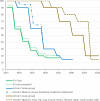The Climate is Changing for Metered-Dose Inhalers and Action is Needed
- PMID: 32801643
- PMCID: PMC7410333
- DOI: 10.2147/DDDT.S262141
The Climate is Changing for Metered-Dose Inhalers and Action is Needed
Abstract
Increases in global temperature are already having a significant impact on our climate. The hydrofluorocarbon (HFC) propellants used today in pressurized metered-dose inhalers (pMDIs) have global warming potential (GWP) many times that of carbon dioxide. Their use, together with all other emissive uses of HFCs, is being phased down under the Montreal protocol. This has prompted calls to switch patients to dry powder inhalers (DPIs). This paper presents a new analysis of the top 15 respiratory drug markets by drug class. It shows that a switch to DPIs would be economically feasible for most countries and most drugs. However, a wholesale switch of reliever medications, notably short-acting β-agonists, would lead to significant increases in the cost of these life-saving medications. Reviewing the evidence, whilst most patients are capable of using DPIs, the very young, very old and those undergoing an acute exacerbation still require a pMDI. Thus, there is a clinical and economic need to have both pMDIs and DPIs available. At the same time, it is projected that the reduction in non-medical uses of propellants is likely to give rise to a 5-fold increase in their cost for pMDI uses and is likely to hit the Western world in 2025. This may lead to a price increase in reliever medication that will make it unaffordable for the poorer communities in some markets. At the same time, opportunities to save money by developing new formulations using propellants with lower GWP, such as HFC 152a or HFO 1234ze(E), are described. Two companies have made this commitment, but neither currently have a strong presence in reliever medication. For them, or other companies, now is the time to act; 2025 is not far away in terms of product development timescales and the climate cannot wait.
Keywords: F-gases; climate change; global warming; inhalers; propellants; respiratory drug market.
© 2020 Pritchard.
Conflict of interest statement
The author consults with a variety of clients, some of whom may be commercially impacted by regulations impacting the use of propellants in MDIs. He also has minority ownership of shares in pharmaceutical companies who develop, manufacture and sell respiratory products that are impacted by such regulations. He received no financial support in relation to the writing of this article.
Figures





References
-
- Pritchard JN. The environmental impact of propellants – what now? In: Drug Delivery to the Lungs. 10-13 Bristol, UK: The Aerosol Society; 2019.
-
- Intergovernmental Panel on Climate Change Climate Change 2013: The Physical Science Basis. Contribution of Working Group I to the Fifth Assessment Report of the Intergovernmental Panel on Climate Change. Stocker TF, Qin D, Plattner G-K, et al., Editors. Cambridge, United Kingdom: Cambridge University Press; 2013. 1535 pp
-
- World Meteorological Organization. WMO Statement on the state of the global climate in 2018. Available from: https://library.wmo.int/doc_num.php?explnum_id=5789. Accessed July 17, 2020.
-
- United National Environment Programme. Assessment report of the technology and economic assessment panel; 2014. Available from: https://ozone.unep.org/sites/default/files/2019-05/TEAP_Assessment_repor.... Accessed July 17, 2020.
MeSH terms
Substances
LinkOut - more resources
Full Text Sources
Other Literature Sources
Medical

